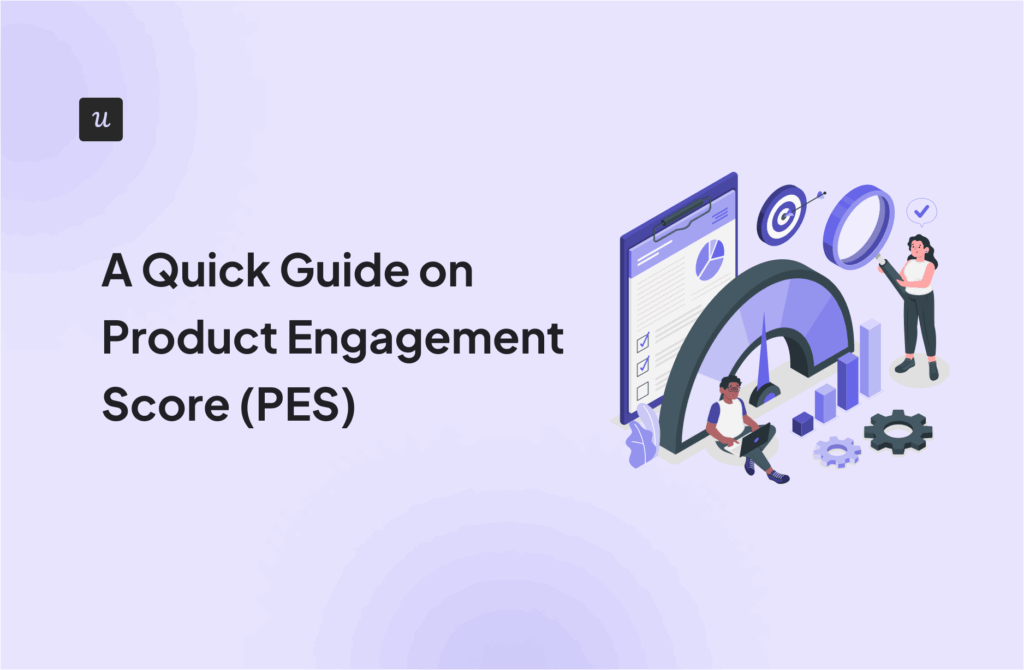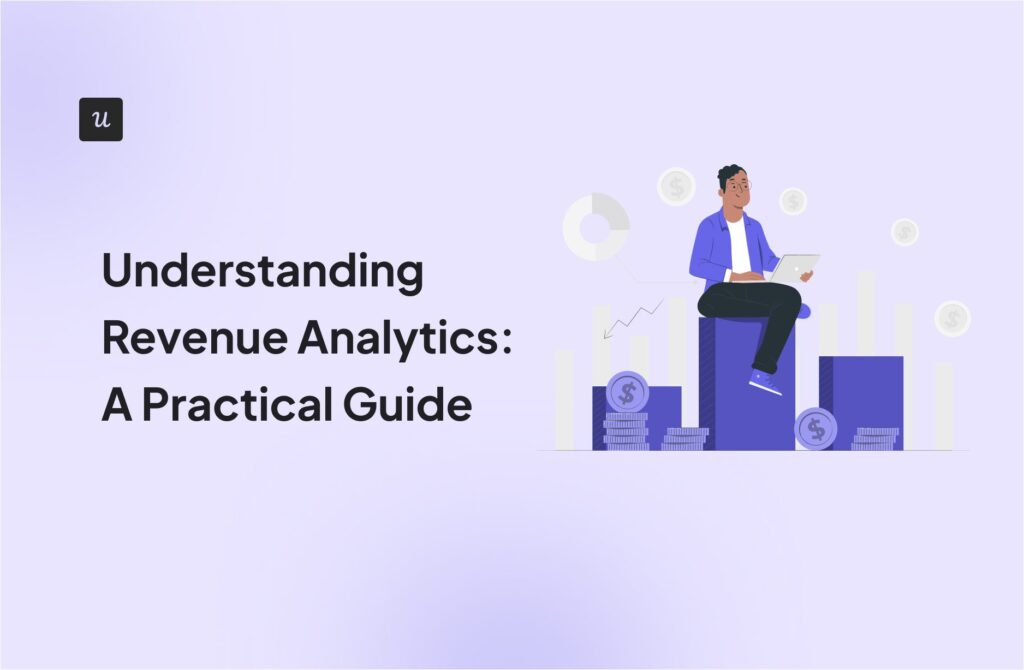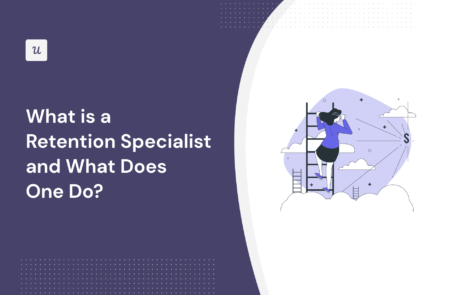
Tired of the increasing customer churn rate? Looks like it’s time to call in a retention specialist.
A dynamic retention specialist will implement proactive strategies to improve the customer experience and increase loyalty, thus improving customer retention.
In this article, we highlight the job responsibilities of a retention specialist, the skills needed to become one, and the resources these professionals can benefit from.
Try Userpilot Now
See Why 1,000+ Teams Choose Userpilot

Retention specialist – quick summary
- A retention specialist works to increase loyalty and customer retention by resolving customer complaints and implementing retention strategies.
- Also known as customer retention specialists, they are typically a part of the customer success or sales team.
- There are 4 main responsibilities that every retention specialist job description should have:
- Gathering information from customer feedback and complaints and working to resolve them.
- Developing strategies to reduce churn and increase customer lifetime value.
- Measuring KPIs to gauge the success of retention efforts.
- Monitoring and analyzing customer retention through reports.
A great retention specialist must have the following skills:
- Excellent communication and negotiation skills.
- Great interpersonal skills, such as empathy and patience.
- Effective conflict resolution skills.
- Advanced organizational skills, such as time management.
- Problem-solving skills, such as research and analysis.
- The average salary for a retention specialist varies based on location, education (for example, whether the candidate has a Bachelor’s degree), company, and professional experience.
- According to Glassdoor, the standard salary is 63,816$, whereas on ZipRecruiter, it is 45,573$.
- To become a retention specialist, you will most often need a Bachelor’s degree in a relevant field.
- A retention specialist needs to be proficient in an array of software across categories. Some of these include user behavior tracking tools, CRM software, feedback, and project management tools.
What is a retention specialist?
A retention specialist is a person in charge of designing and implementing customer retention strategies in order to reduce churn, retain existing business, and increase loyalty.
Retention specialist job description: 4 Key Responsibilities
We’ve already covered that the main responsibility of a retention specialist is churn management. But what exactly does that entail?
Let’s dive deeper into what the retention specialist job description should include, and why.
Gather feedback on customer complaints and resolve them
Listening to the voice of the customer and effectively resolving customer complaints is a necessary ability for any retention specialist.
Using surveys and interviews is a great way of getting deeper insights into customer problems.
After the feedback analysis stage is complete, the next step is acting on the insights. This means the retention specialist needs to develop and implement solutions based on feedback to retain customers.
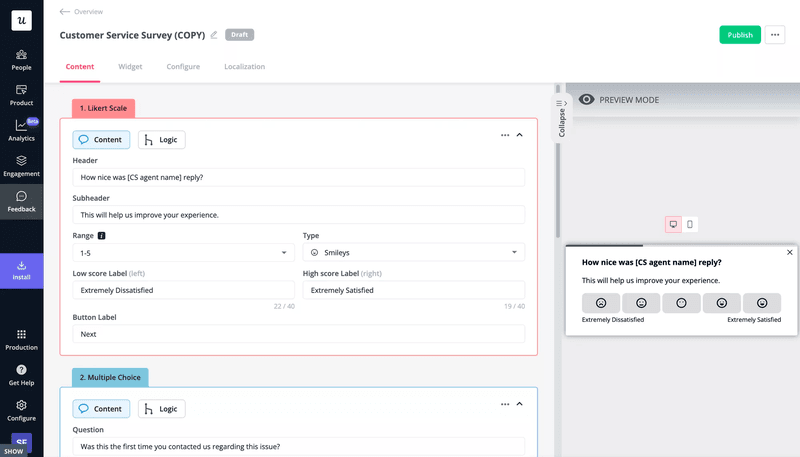
Develop various strategies to increase customer lifetime value
A retention specialist’s job goes beyond keeping customers, it also includes turning them into raving fans and convincing them to invest in higher-tier plans. This ultimately benefits the company’s bottom line by boosting the customer’s lifetime value.
There are different approaches you can take to push customers toward loyalty at every stage of the journey.
An example of a retention strategy could be winning back disengaged users by sending them re-engagement emails.

Measure key performance metrics related to churn and retention efforts
Once the retention specialist implements a strategy, it’s important to measure its success by tracking relevant performance indicators.
Here are some of the important metrics and KPIs every retention specialist should track:
- Customer retention rate: Measures the percentage of users who continue using your product over a given time period. This metric helps understand if your retention strategy is working or not.
- Customer churn rate: Calculates the rate at which customers discontinue use of your product. Tracking this uncovers periods where customers are dissatisfied and helps spot churn trends among different segments.
- Monthly recurring revenue: Calculates the revenue you expect to generate every month from active subscriptions. Tracking MRR growth provides insight into your product’s health.
- Customer lifetime value: Measures the total earnings per customer throughout their relationship with you. This helps with revenue forecasting and identifying loyal customers.
- Product stickiness: Stickiness is when customers derive repeat value from your product so they keep returning to it. Tracking this highlights account expansion opportunities.
- Revenue churn rate: Measures the rate at which revenue is lost during a period. This is vital in understanding why customers are leaving your product.
- Net Promoter Score: Determines the percentage of customers who are brand advocates. This helps gauge customer loyalty and the likelihood of word-of-mouth promotion.
Monitor customer retention with reports
Lastly, being proficient at retention analysis and its reporting is a key responsibility of any good specialist.
A typical retention analysis includes tracking user behavior and visualizing it with retention tables. This helps see how retention strategies are performing over time.
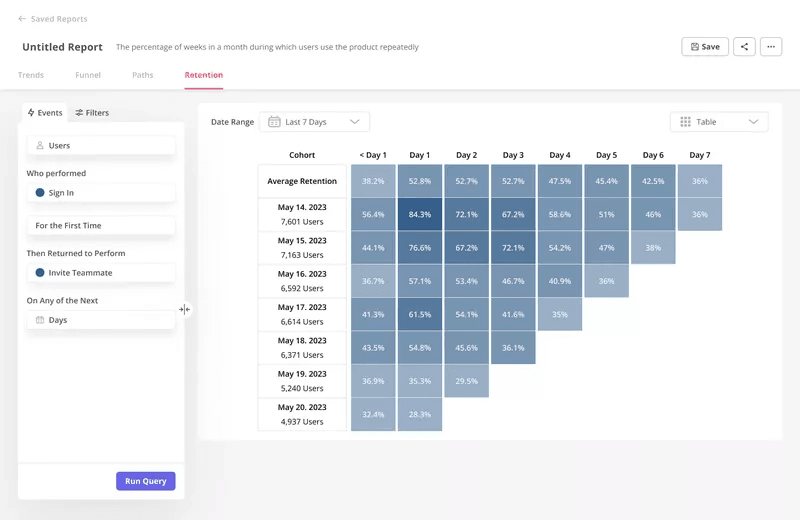
Key skills for becoming a dynamic retention specialist
Next, we look at the vital skills that every great retention specialist needs to set them apart. Here are the five must-have skills for every good retention specialist:
- Strong communication and negotiation skills: Negotiating with customers to renew contracts and understand reservations isn’t easy. This is why every retention specialist needs to have great customer communication and negotiation skills.
- Empathy and patience: The ability to put oneself into another person’s shoes and maintain calmness in different situations is what sets apart a great retention specialist. This is because, as a retention specialist, you will be on the frontline with customers, sometimes with very angry and upset ones, with whom you still need to find common ground.
- Conflict resolution skills: It’s important to resolve customer problems in a productive manner, ending any dispute with a positive customer experience.
- Advanced organizational skills: A retention specialist manages dozens of client accounts and switches between different tasks. Thus, strong organizational and time management skills are vital to stay on track.
- Problem-solving skills: Lastly, the retention specialist’s prime responsibility is to develop solutions to customer problems. So it naturally follows that having creativity and problem-solving skills is a necessary prerequisite to the role.
What’s the average retention specialist salary?
The retention specialist salary will vary depending on multiple factors, like location, company, and candidate’s professional experience.
According to Glassdoor, the standard salary for a Retention Specialist is 63,816$.
However, according to ZipRecruiter, it’s 45,573$ annually or 22$ hourly.
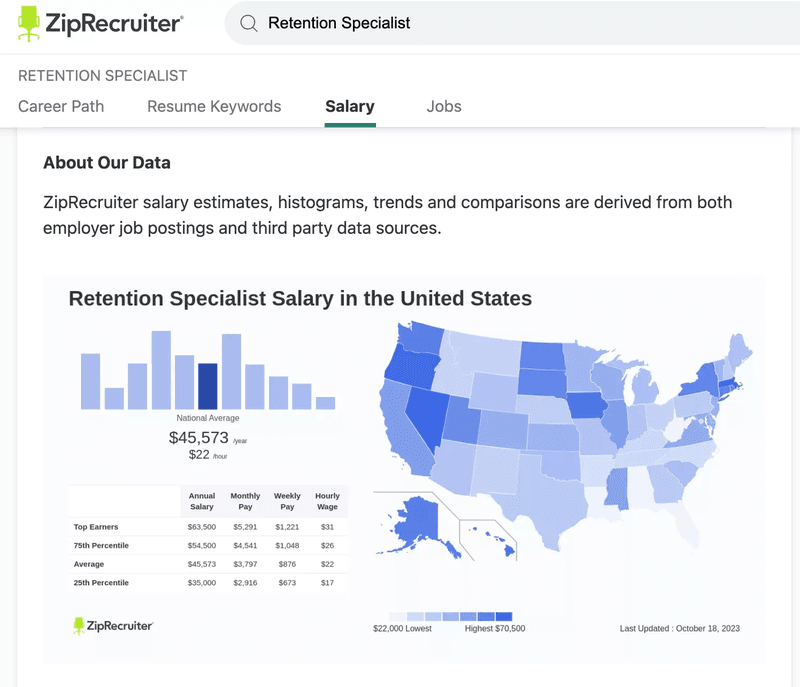
Top sales and marketing software for customer retention specialists
There are different categories of sales and marketing software used by retention specialists, each serving a specific purpose.
Behavior-tracking tools visualize user paths and highlight friction points. In contrast, customer relationship management tools track communication and nurture customer relationships.
Feedback tools provide information on what customers think about your products. Finally, project management software assists in effective task handling.
Here are our recommendations for customer retention tools to try out in all these categories:
- User behavior tracking tools: Userpilot, Mixpanel, Hotjar
- Customer relationship management tools: Hubspot, Zendesk, Freshdesk
- Feedback tools: Userpilot, Qualaroo, SurveyMonkey
- Project management tools: Asana, ClickUp, Jira
How to become a retention specialist?
To become a retention specialist, you need at least a high school diploma. In addition to that, oftentimes, you will even need a Bachelor’s degree in business administration, marketing, or a related field.
Besides formal education, there are also online courses, webinars, and books to help you learn about the field. Here are some useful resources for any aspiring retention specialist out there:
- Userpilot’s on-demand webinars on product-led growth and customer success.

- “Delivering Happiness” book by the Zappos CEO Tony Hsieh.
- “Never Lose A Customer Again” book by Joey Coleman.
Conclusion
A retention specialist plays a pivotal role in increasing customer loyalty and reducing churn. Moreover, their excellent communication skills and data analysis enable these specialists to seamlessly navigate customer concerns.
Want to find the perfect retention specialist software? Get a Userpilot Demo and see how you can improve customer retention.



